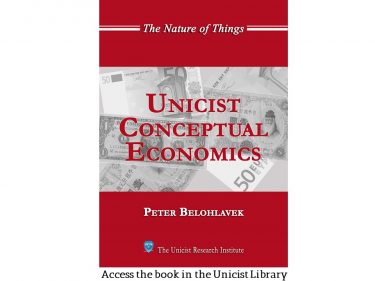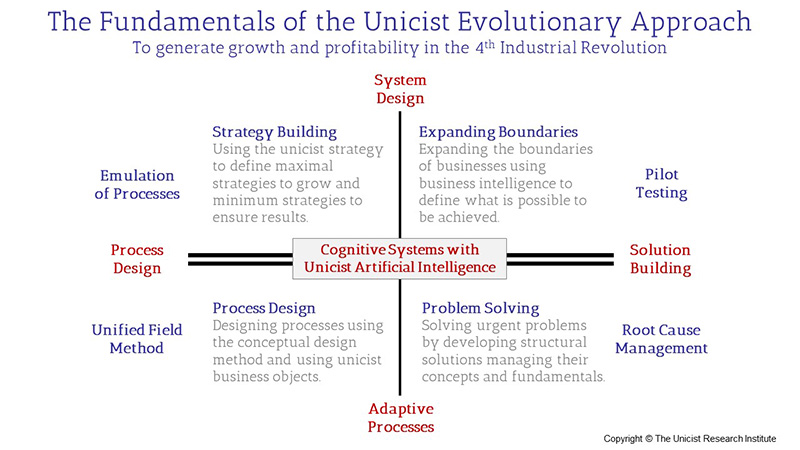United Kingdom: Microeconomics driven Development
A Transgenerational 50-year Project
We invite International organizations, State organizations, private companies, non-profit organizations, think tanks and individuals to participate in a transgenerational 50-year project to establish sustainable economic structures that foster growth and well-being while they minimize economic crises. This is a non-profit activity that needs to be financially self-supported by the activities of the participating organizations to ensure the evolution of this project for 50 years.
Unicist Evolutionary Economics
Evolutionary Economics, Thorstein Bunde Veblen, tried to change economics focusing on social development and sustainability. Unfortunately, the lack of a model to understand and manage evolution transformed evolutionary economics into a utopian framework.
 The discovery of the ontogenesis of evolution, Peter Belohlavek, provided the model needed to recover evolutionary economics to manage the sustainability of economic evolution based the empowerment of knowledge economy and microeconomics driven development.
The discovery of the ontogenesis of evolution, Peter Belohlavek, provided the model needed to recover evolutionary economics to manage the sustainability of economic evolution based the empowerment of knowledge economy and microeconomics driven development.
It has to be considered that in an evolutionary approach, microeconomics drives the evolution while macroeconomics establishes the framework for social development.
The microeconomic initiative is lost when macroeconomics intends to be the driver of evolution. Macroeconomics driven economies are only functional in transition stages when there is an extreme need for avoiding chaos.
The Scope of the Projects
There are four countries that can be considered as paradigmatic examples of microeconomics driven evolution: USA, China, Japan and Germany. It requires entering the depth of their economic behavior to find that they are driven by microeconomics although their cultural archetypes and behaviors are significantly different.
The initial projects that are being promoted are:
- Argentina: dealing with stable and sustainable development (access)
- Brazil: dealing with the empowerment of the emergent segments of the economy (access)
- Spain: dealing with the empowerment of economic integration (access)
- Ukraine: dealing with sustainable globalization (access)
- United Kingdom: dealing with the empowerment of the post-Brexit economy
The next stage is to expand the projects to countries that are fully oil, mining or agriculture dependent.
The Framework
 This project is based on the existence of economic democracy. We suggest that you access the document on the Nature of Democracy to learn about the context of the project.
This project is based on the existence of economic democracy. We suggest that you access the document on the Nature of Democracy to learn about the context of the project.
The project of developing sustainable economies by using a “microeconomics driven development” approach is based on Evolutionary Economics. The approach to evolutionary economics is based on the Ontogenesis of Evolution, the Unicist Conceptual Anthropology and the Unicist Conceptual Economy (Peter Belohlavek) that can be found in the Unicist Root Cause Library.
It uses the concept of knowledge economy to foster the emergent segment of a society that represents less than 5% of the activity but drives the whole economy towards a superior level of productivity and well-being.
It uses the concept of the 4th Industrial Revolution to promote adaptive industrial processes (whatever the industry), customer orientation, superior productivity and superior quality to ensure the participation in a sustainable globalization process.
Promoting Abductive Reasoning to Foster Expansion
The unicist evolutionary approach is based on the discovery that human actions are driven by the concepts people have in their minds, which are triggered by the conceptual short-term memory (CSTM).
This approach manages the concepts and fundamentals of what is being done, emulating the intelligence, organization and evolution of nature to develop maximal strategies to grow and minimum strategies to survive.
It uses abductive, inductive and deductive reasoning to forecast, produce and ensure results. Abductive reasoning is used to access the concepts of things and defines the possibilities of what can be achieved, inductive reasoning is used to develop destructive tests to confirm the limits of the validity of knowledge and deductive reasoning is used to develop validation tests and manage the operation.
The Project
Microeconomics driven Development is, by definition, a bottom up project that fosters the empowerment of the cultural belonging, the value of work, the value of learning and the installation of a second opportunity ethics. It is a 50-year transgenerational project that is based on taking advantage of the adolescent rebellions to install those values which are self-evident when evolution is a value.
 The bottom up approach empowers economic development but requires managing the concepts of what is being done to avoid chaotic actions the annul the functionality of actions.
The bottom up approach empowers economic development but requires managing the concepts of what is being done to avoid chaotic actions the annul the functionality of actions.
Conceptualization and bottom up approaches are necessary to manage evolutionary processes, the knowledge economy and the concepts of the 4th Industrial Revolution.
The project is managed by local think tanks, foundations and volunteers.
It is proposed to install in countries that for some reason need a new stage driven by microeconomics to develop stable, sustainable growth.
Roles included in the Project
1) Private Companies
The project is developed in countries where the long-term sustainability is government dependent and is not installed in the collective intelligence and the State organization.
 What is being proposed is that the private companies adopt the unicist evolutionary approach, that emulates the intelligence of nature. On the one hand, this allows developing maximal strategies to grow and minimum strategies to ensure survival.
What is being proposed is that the private companies adopt the unicist evolutionary approach, that emulates the intelligence of nature. On the one hand, this allows developing maximal strategies to grow and minimum strategies to ensure survival.
On the other hand, it allows developing conjunctural strategies and long-term strategies that empower growth and profitability.
These companies participate as sponsors of the program by introducing the unicist evolutionary approach. There are no costs involved for the companies but their participation in a group that monitors the evolution of the project..
2) Research & Innovation
The empowerment of research and innovation in the emergent segment of the economy requires that the educational program for graduates become fully action driven, which requires introducing research as the driver of learning.
It also requires that the patent laws expand their scope of patentable issues, following the trend of the most flexible patent laws of the developed world.
The protection of the intellectual property requires ensuring that the functionality of the judiciary systems makes it feasible. The tax incentive of research activities, based on the long-term ROI of R&D, is a catalyst or a limit to expand these activities.
3) Education
 The objective in education is to establish a superior standard that allows generating leaders that deal with long-term planning to foster the stable evolution of a culture based on a strong identity that allows participating in the globalized world.
The objective in education is to establish a superior standard that allows generating leaders that deal with long-term planning to foster the stable evolution of a culture based on a strong identity that allows participating in the globalized world.
It is based on fostering the adolescent rebellion by doing things driven by unicist reflection, action-reflection-action, which allows adolescents to oppose the establishment through actions.
This is promoted by extracurricular activities based on managing critical thinking, that fosters actions, and double dialectical thinking, that allows managing the dynamics of things. These processes are sustained by interfaces with unicist artificial intelligence.
4) Capital Markets
We propose the full association between capital and R&D to foster that capital seeks innovations and not that innovations seek capital. It implies fostering the following private or public financial roles:
Angel/Seed Funds should provide the necessary business knowledge to move the business from a solopreneurial approach to an entrepreneurial approach.
Venture Capital should provide the necessary business knowledge to move the business from an entrepreneurial approach to an enterprising approach, where the organization works as a system.
Private equity should provide the adequate financial strategies to sustain growth based on the functionality of businesses that allow expanding their boundaries.
The financial activities to foster self-employment are not part of the project.
5) Sustainable Globalization
Globalization building implies expanding limits. Expanding limits implies necessarily an active competition to be able to influence the environment.
 It requires generating the necessary added value to influence the environment in order to be accepted. Sustainable globalization is a structured globalization that establishes a common space where this competition is equilibrated with an active cooperation.
It requires generating the necessary added value to influence the environment in order to be accepted. Sustainable globalization is a structured globalization that establishes a common space where this competition is equilibrated with an active cooperation.
This cooperation allows fostering the possibilities of empowering the role of participants in the world.
It requires developing diplomatic power, which implies integrating all the efforts that allow catalyzing and defending the value of a culture in order to exert influence, where this is possible.
6) Leadership Development
 This program is developed by the local organizations that manage the project and provide their financial sustainability.
This program is developed by the local organizations that manage the project and provide their financial sustainability.
It gives access to conceptualization that allows developing personal long-term and short-term strategies.
The knowledge of the structure of the concepts of what one is doing gives people the freedom to choose among multiple alternative ways to act without losing the focus on the purpose that has to be achieved.
The program provides the logical tools that allow upgrading personal strategy towards a superior level.
It gives access to the core aspects of the unicist approach to strategy applied to personal use and business use.
7) Public Opinion
The values of a culture can be read between the lines and behind the images of the cover of newspapers and their homepages on the Internet.
Introducing the empowerment of the cultural belonging, the value of work, the value of learning and the installation of a second opportunity ethics necessarily works when it is installed in the public opinion.
It implies developing actions that generate the public recognition of authentic leaders while fostering equal opportunities for all.
The public opinion actions fully depend on the cultural characteristics of the environment and are focused on physical and electronic media and the use of the social networks.
8) Social Laboratory
The Social Lab measures the functionality of the framework of microeconomics driven development and allows managing the horizon of its evolution.
 Social processes are necessarily dynamic and evolve driven by the evolution of the participants. This evolution is never symmetric, whatever the reasons that generate the asymmetry.
Social processes are necessarily dynamic and evolve driven by the evolution of the participants. This evolution is never symmetric, whatever the reasons that generate the asymmetry.
The measurement of the evolution is made using the unicist scorecard that establishes the quantitative measurement of the dynamics of the economy.
The unicist scorecard was developed to monitor and interpret the functionality of the unified field of adaptive environments. The scorecard includes: 1) Operational indicators, 2) Causative indicators, 3) Unicist predictors
Learn more:
https://www.unicist.net/economics/technologies/




